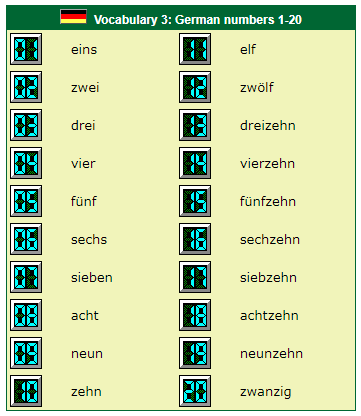A firm grasp of numbers in German is essential when you visit a German-speaking country. It's helpful to be able to say numbers, but particularly to understand them when spoken quickly in shops and restaurants, railway stations and airports etc.
Here are the German numbers from one to twenty. Click either here or on the sound icon at the top of the page to listen to them being spoken by a native German speaker:

Notes
1) "Eins" is used for counting and when you are reading out telephone numbers or a list of lottery numbers. When it precedes a noun - e.g. "one house", then you should use "ein(e)" as discussed in the previous sections on the indefinite article.
2) All numbers other than "eins" do not add endings - i.e. "vier Jahre", "acht Männer".
3) Sometimes "zwo" is used instead of "zwei" in spoken German to make sure that the similar-sounding "zwei" and "drei" are not confused, especially over the phone.
4) Numbers "thirteen" to "nineteen" are formed by adding the suffix "-zehn" to the appropriate number. Note however that "sechs" loses its final "-s" in "sechzehn", and that "sieben" likewise loses its "-en" in "siebzehn".
5) The German word for "zero" is "null".
A tipHow the numbers are written
Although Germany uses the same numbers as English, they are written in a slightly different way:
The German number one consists not only of a straight vertical line, but also a second line slanting down diagonally to the left.





